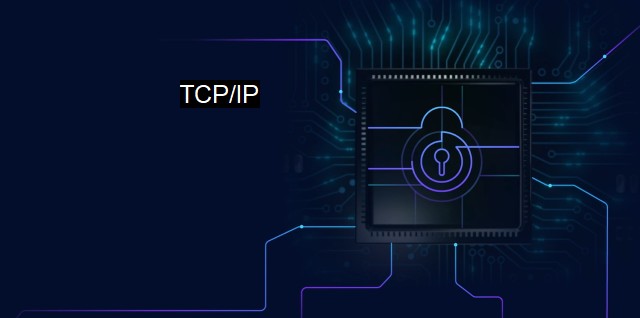What is TCP/IP?
Understanding TCP/IP: The Core Protocol for Safe and Efficient Communication in the Digital Era
TCP/IP, or Transmission Control Protocol/Internet Protocol, is the suite of communications protocols used to connect hosts on the Internet. This set of protocols are fundamental to cybersecurity and antivirus efforts since they lay the groundwork for how data is sent and received over networks.TCP/IP communicates using a set of rules to exchange messages with other internet points at the information packet level. Under the TCP/IP model, the internet protocol (IP) is used for addressing and routing packets of data between networks, while the transmission control protocol (TCP) is responsible for ensuring the reliability of the data communication.
TCP/IP encapsulates data into packets for transmission over the network. When these packets reach their destination, they are de-encapsulated and reassembled into their original form. TCP ensures that these packets are correctly ordered and error-checked, promising the strict delivery of the data packets, and resending if needed. In short, the IP provides the addressing system which tracks the destination where these packets should go, and TCP directs packet delivery from the source to destination, confirming accurate data delivery, fixing errors, and requesting retransmission where required.
Security is naturally a critical aspect when discussing TCP/IP. Given the central role these protocols play in facilitating our modern, interconnected world, their exploitation can lead to significant security incidences. Cybersecurity comes into the equation to ensure the cruel ways these protocols can be manipulated and exploited are blocked, and these efforts are closely tied to TCP/IP.
One type of security concern that exists within the realm of TCP/IP is an IP spoofing attack, where a malicious party imitates another IP address to hide its identity or impersonate another computing system. Some other common TCP/IP security threats would be the denial of service (DoS), Smurf attack, and SYN flooding. These sorts of challenges highlight the essential role cybersecurity plays in securing the TCP/IP suite.
Another key relationship is TCP/IP relevance in antivirus efforts. Given that a considerable percentage of cyber threats reach their targets via the internet, proper addressing and dealing with these packets that shuttle the threats is vital. As mentioned earlier, TCP/IP is akin to mom-and-pop operations in traffic management, ensuring each packet gets where it needs to be, but aided by antivirus software they become a stoic shield.
TCP/IP protocols form a primary line of attack for network-oriented malicious software, thus require continuous monitoring and scrutiny for any suspicious activity. Antivirus software may be employed to dissect the packets that pass between systems, scrutinising for potential malware. If any suspicious packet is detected, for instance, a packet rich in executable code could be antivirus alarming. Consequently, strenuous steps are applied to nullify or disinfect where needed. Antivirus tools patrolling their assigned sectors of our information highways, and controlling check-barriers past which suspicious packets wouldn't pass regularly ensures nothing gets overlooked and our systems remain uncompromised.
TCP/IP protocols originate a common basic language allowing the internet to function and flourish. And yet, they can become vulnerable to cybercriminals and inculcate modern society with substantial security challenges. To deal therewith, vigilant management, and solutions both retrofit and innovative by hardworking cybersecurity professionals and highly evolved antivirus software stand top in the industry.
TCP/IP ushers the data packets safely between server, internet, and the end user; cybersecurity makes sure the channels used and destinations remain secure; and antivirus software ensures not only about the parcels but the contents are safe. Working together, allowing efficient customer service and secure data exchange sustaining the very foundation of the interconnected World Wide Web.

TCP/IP FAQs
What is TCP/IP and why is it important in cybersecurity?
TCP/IP is a set of protocols that enable communication between devices connected to the internet or any network. It is crucial in cybersecurity because it provides a standardized framework for the secure transfer of data over networks. Without TCP/IP, there would be no standardized way to ensure secure communication and protection against cyber threats.How does antivirus software use TCP/IP in cybersecurity?
Antivirus software uses TCP/IP to communicate with the internet and other devices on a network. When scanning for malware, antivirus software often leverages TCP/IP to access remote servers and databases to compare files against known malware signatures.What are the different layers of TCP/IP?
TCP/IP consists of four layers: the application layer, the transport layer, the internet layer, and the network access layer. Each layer performs specific functions, such as identifying the destination of data packets, ensuring reliable transmission, and determining the physical address of network devices.What is the role of TCP/IP in data transmission?
TCP/IP plays a critical role in data transmission by dividing data into packets and routing them to their intended destination through the use of Internet Protocol (IP). TCP ensures reliable transmission by establishing a connection between the sender and receiver, breaking the data into manageable chunks, and tracking each packet's progress until it reaches its destination. This helps to ensure that data is transmitted securely and without errors.Related Topics
Firewalls Packet sniffing Malware analysis Vulnerability scanning Intrusion prevention systems
| | A | | | B | | | C | | | D | | | E | | | F | | | G | | | H | | | I | | | J | | | K | | | L | | | M | |
| | N | | | O | | | P | | | Q | | | R | | | S | | | T | | | U | | | V | | | W | | | X | | | Y | | | Z | |
| | 1 | | | 2 | | | 3 | | | 4 | | | 7 | | | 8 | | |||||||